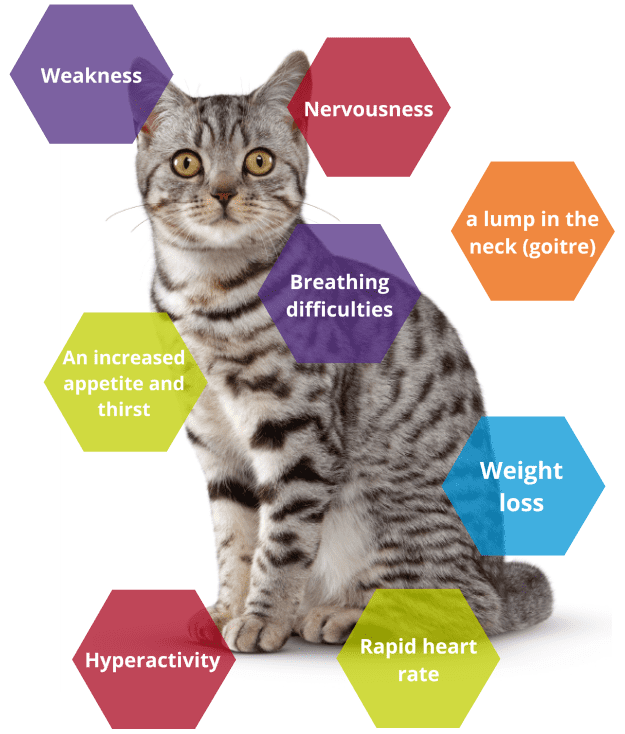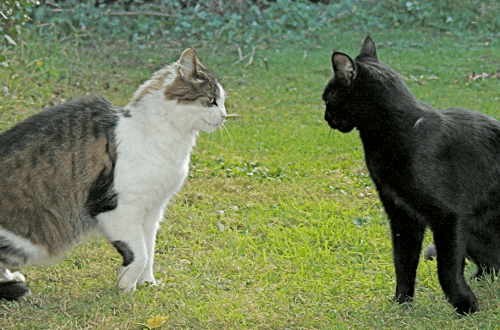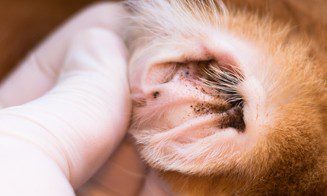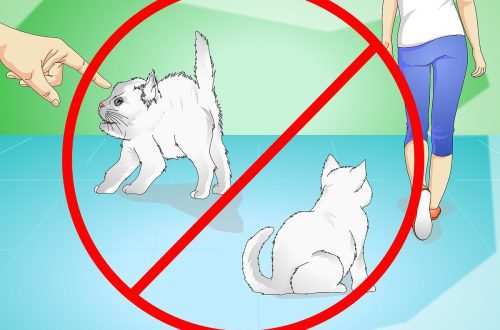
Hyperthyroidism in cats: signs, control and treatment
What is hyperthyroidism?
The thyroid gland, located in your cat’s neck, uses dietary iodine to produce thyroid hormones that help regulate important bodily functions, including:
- Metabolism.
- Body temperature.
- Blood pressure.
- Heart rate.
- gastrointestinal function.
Hyperthyroidism is a fairly common endocrinological disorder in cats that is characterized by high levels of circulating thyroid hormones. In cats, hyperthyroidism is almost always associated with an overactive thyroid gland, which is most often diagnosed in older cats over the age of 10 years. If left untreated, hyperthyroidism can lead to serious and sometimes fatal effects on vital organs such as the heart and kidneys. The good news is that this disease is highly treatable and can be controlled with proper veterinary care.
If your cat has hyperthyroidism, the thyroid gland enlarges and produces excessive amounts of thyroid hormones.
Warning signs and symptoms of hyperthyroidism in cats
Signs of hyperthyroidism can vary in severity depending on how long the pet has been sick. If your pet shows any of the following signs, contact your veterinarian immediately:
- Weight loss.
- Increased appetite.
- Diarrhea and/or vomiting.
- Strong thirst.
- Poor condition of the skin and coat.
- Hyperactivity.
Cats with chronic renal failure and diabetes mellitus have some signs similar to hyperthyroidism. Your veterinarian may need to perform additional tests to rule out these diseases and make an accurate diagnosis.
Fight against hyperthyroidism
There are four possible treatment options for cats with hyperthyroidism:
- Daily Nutrition: Limiting dietary iodine intake reduces thyroid hormone production.
- Daily medications: Antithyroid medications suppress the production of thyroid hormones.
- Radioactive iodine therapy: for the treatment of abnormal thyroid tissue.
- Surgical intervention: removal of the affected thyroid tissue.
Treatment: the importance of nutrition
The health of an old cat and her condition in general depends largely on the food she eats. A balanced diet is an essential part of an active, healthy lifestyle. For an accurate diagnosis and treatment options, always consult your veterinarian and ask them to recommend the best food for your cat’s thyroid health.
Thyroid Health Questions to Ask Your Veterinarian
1. What are the functions of the thyroid gland and how can this affect my cat’s health?
2. What are the treatment options if my cat has a thyroid problem?
- What factors should be taken into account when choosing a treatment option for this disease?
- What if my cat has other health problems? How will this affect your treatment recommendations?
3. What are the pros and cons of surgery or radioiodine therapy?
- How will possible complications be eliminated?
- Where will the operation or radioiodine therapy be performed?
- When can I take my cat home?
- What do I need to know when I bring her home?
- Is there a chance that the thyroid problem will return after any of these procedures?
4. If antithyroid drugs are recommended, how often should I give them to my cat?
- What is the best way to give medicine?
- How long does my cat need to take medication?
- Are there any possible side effects? What to do when they occur?
5. Can nutrition be used to correct thyroid problems? Would you recommend Hill’s Prescription Diet for my cat’s thyroid health?
- How do I transition my cat to Prescription Diet?
- Will I have to feed my cat this food for the rest of my life?
- Can I give my cat treats? How will other medications or supplements affect nutritional efficiency?
- Can my other cats eat this food? How can I make sure that each of my cats is eating the right food?
6. How often will I need to bring my cat to the clinic for a checkup?
- What indicators will you check during these control checks?
7. What is the best way to contact you or your clinic if I have questions?
- Ask if you will need to come back for a follow-up appointment.
- Ask if you will receive a notification or email reminder of this.





